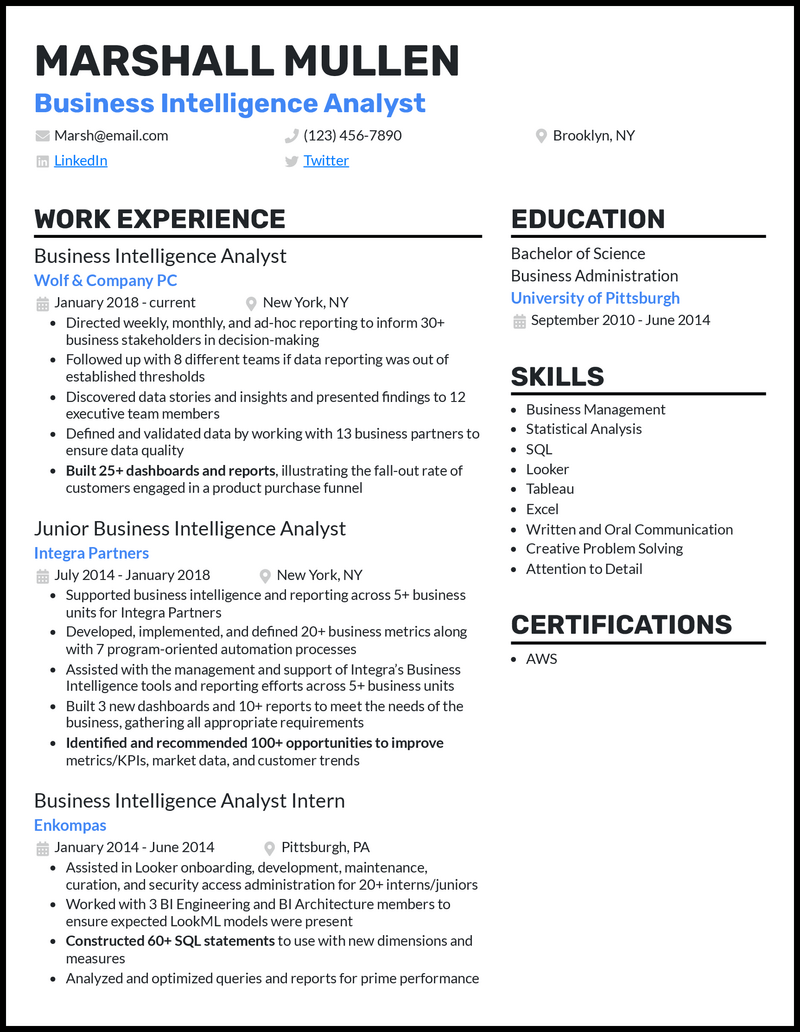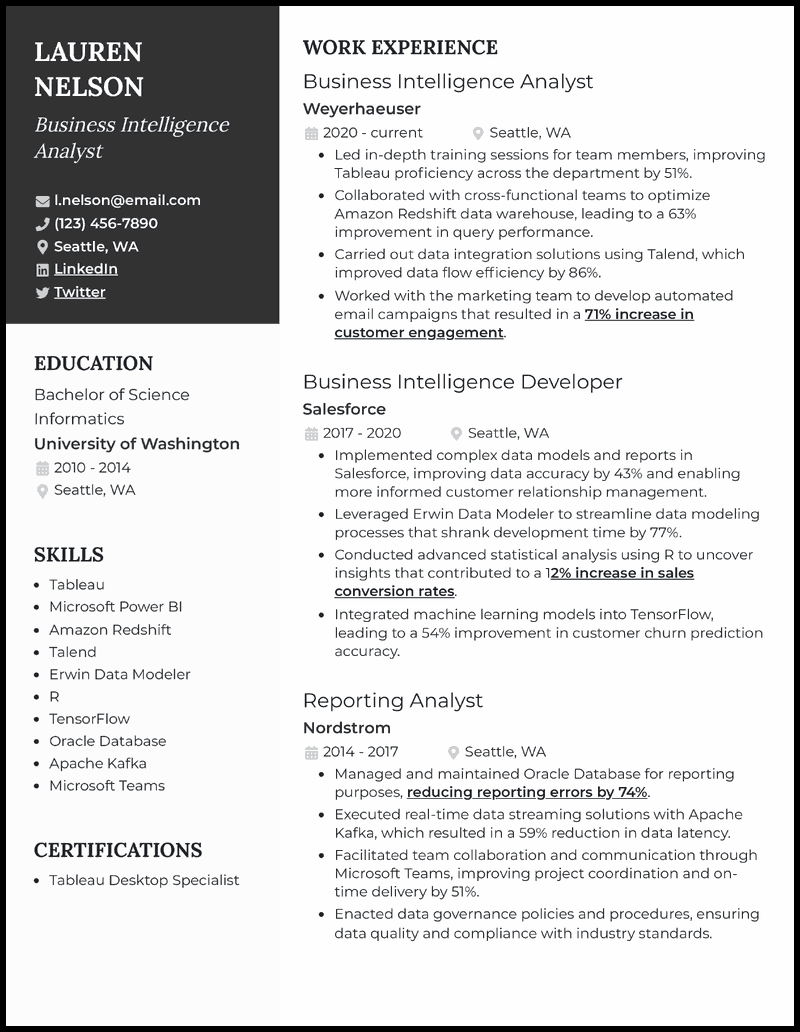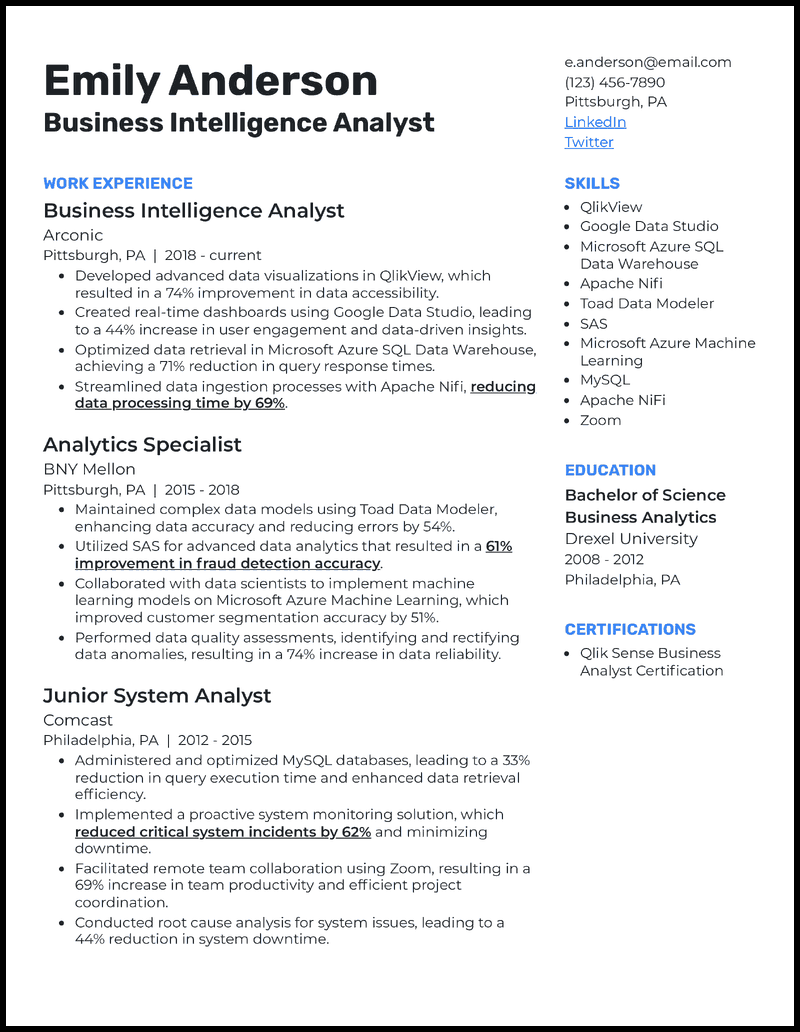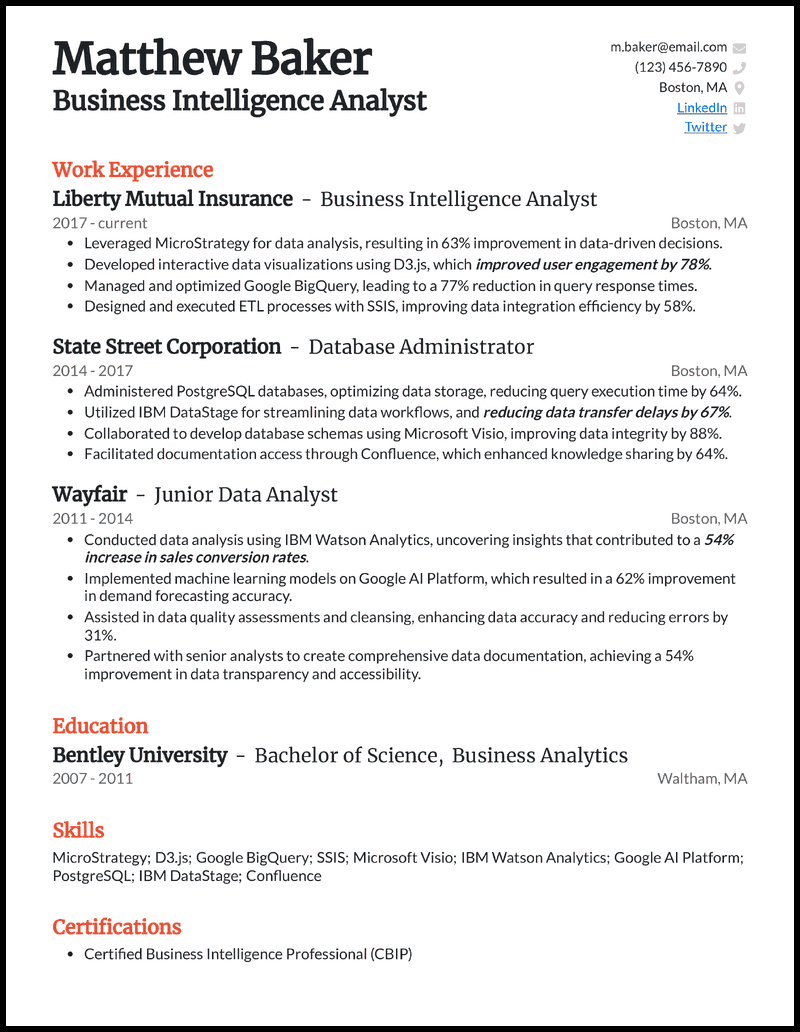Marshall Mullen was grateful to gain a business intelligence analyst internship right after earning his B.S. in business administration. After gaining valuable soft and hard skills from his internship, he knew he’d have to relocate for the job he truly wanted—but as he booked his moving flight, he knew it would be worth it.
While Marshall prepared his application for a role in New York City, he imagined how good it would feel to get a job in his dream field—but would his old resume cut it? Luckily, Marshall found our resume builder to help pursue this incredible life change. When he got the job offer, he was thrilled by the stability and opportunities ahead.
No matter where you’re looking to nail down your next role, you can find success like Marshall did with our help. Try starting with these 15 business intelligence analyst resume examples!
Why this resume works
- You’re whipping up a business intelligence analyst resume, hoping it could open doors at premier firms. And you’ve dotted your i’s and crossed your t’s with all the essentials—think experiences, skills, and certifications. However, skip adding that glam shot of yourself, even if you think it’s particularly flattering.
- Unless the job ad explicitly asks for a photo, keep it out. It could unintentionally give away personal deets like your age and race, which, believe it or not, might open a can of worms called discrimination. It’s not cool, but it happens and could mess with your chances.
What Truly Matters: Your Skills & Work Experience

When recruiters check out your AI cover letter and resume, they first want to see you have the required data analytics skills. They know their most pressing business intelligence needs and want to know if you can meet those needs.
The hiring team will jump directly to your “skills” section to determine this. Here is where your resume will go into the “no” pile if they don’t believe you have the minimum qualifications for the job.
It’s best to focus on the top two to three data analytics skills you have that align with what the company is seeking based on the job description.
9 top business intelligence analyst skills
- Data analysis
- Data security
- Data visualization
- Data prep & reporting
- BI strategic planning
- Stakeholder partnership
- Keen finance acumen
- Descriptive analytics
- Statistical analysis
Sample business intelligence analyst work experience bullet points
As a business intelligence analyst, you have many hard skills to highlight on your resume. This is good news. Your job, then, is to emphasize how those hard skills improved a company’s business intelligence efforts and bottom line.
Highlight the different areas of business intelligence analysis you’ve touched on and discuss your role in meeting the needs of department heads and business users.
Provide context for the types of data you gathered, analyzed, and cleaned, and the business areas of focus, then describe your impact. Offer up as much quantifiable data as possible that shows your impact vs. simply describing your job responsibilities.
Here are a few ideas from our sample resumes:
- Defined and analyzed 30+ data points for monthly supply chain cost reports that supported the development of cost-cutting efforts, saving the company $100K annually while improving supply chain efficiency by 3%
- Developed, implemented, and defined 20+ business metrics along with seven program-oriented automation processes, which improved data reporting efficiency by 7% and reduced procurement costs by 4%
- Constructed 60+ SQL statements to use with new dimensions and measures to replace antiquated reporting measures and improve data retrieval capability
- Built 25+ BI dashboards and reports that illustrated the fall-out rate of customers engaged in a product purchase funnel, leading to the implementation of process improvement strategies that reduced fall-out by 11% over six months
Top 5 Tips for Your Business Intelligence Analyst Resume
- Data ownership and expertise are key
- You’re being hired to help the business improve its metrics, like revenue, profits, cost reduction, and customer engagement. Focus on and make your work experience bullet points showcase your high level of data ownership and expertise to improve these business metrics.
- It’s all about the numbers
- Quantifiable data shows the recruiter what you can do. It provides a story of your impact and allows them to visualize how those accomplishments will help you succeed on the job. For example, reduction in cost by 5%, increase in productivity by 8%, and streamlining and consolidating five reports into a single report for easier data assimilation.
- Be specific about your business intelligence experience
- No one individual being hired is expected to know everything in their field of expertise. So, for your resume, be specific and highlight where you truly stand out in your field to capture a recruiter’s attention, like the time you caught an error in reporting to reduce costs by $10K in a quarter or identified process improvement to boost sales by 11% over two quarters.
- Tailor your resume for each job application
- If the company mentions in its job listing that it needs descriptive analytics expertise, but your resume only mentions statistical analysis, you may be out of luck. Customization should only take 10 to 15 minutes per application, and it’s well worth your time, since it lets the company know you’ve done your homework.
- Showcase your ability to communicate effectively
- As a business intelligence analyst, you regularly communicate your findings with business leaders and users. Showcase your ability to effectively communicate your insights and conclusions to remove any questions about this capability.
If you include a career objective, you want to tailor it for each application you submit. It should consist of a few critical skills with your years of experience and goal.
For example: “Resourceful and insightful professional with over seven years of experience as a business intelligence analyst, providing me with excellent analytical, technical, and communication skills. Eager to thrive in KeyLogic Systems’s flexible and fast-paced environment to achieve and exceed client goals and expectations.”
The best format for a business intelligence analyst resume is reverse-chronological. Your internships and entry-level BA roles help set the foundation for your career and should be at the bottom, so your most recent and most relevant work can be at the top of the page, where it’s easy for the reader to see.
Certifications can fall under their own category or be included under your resume’s education section. If you choose the latter, list your certifications below your degrees, such as Microsoft Certified: Power BI Data Analyst Associate or Certified Business Intelligence Professional.




















